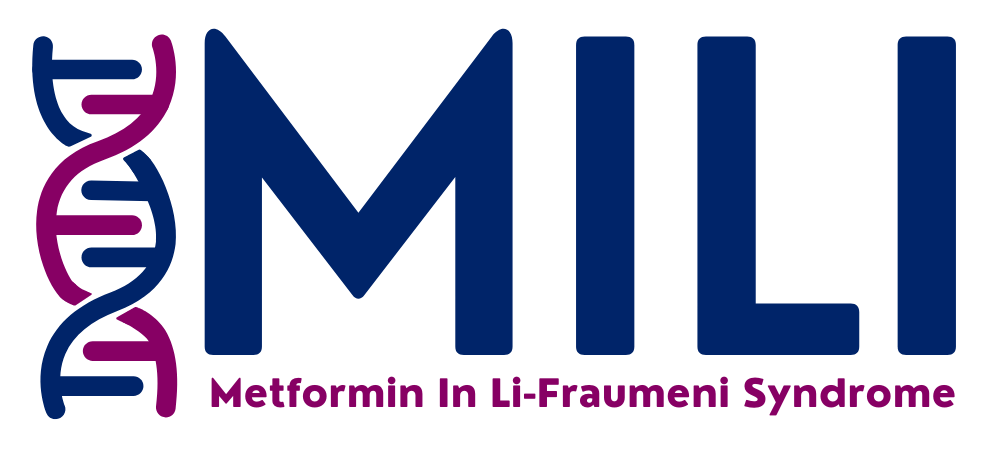If you are interested in opening as a Recruiting Centre for MILI, please the OCTO team via email at octo-mili@oncology.ox.ac.uk
If you are interested in taking part in MILI as a participant, please contact your local genetics centre.
Metformin in Li Fraumeni (MILI) Trial: A Phase II Randomised open-label cancer prevention trial of Metformin in adults with Li Fraumeni Syndrome | ||
Short Title: | Metformin in LFS (MILI) Trial | |
MILI | ||
Clinical Phase: | II | |
Trial Design: | Open label, randomised control phase II trial | |
Countries of Recruitment | UK | |
| Objectives | Endpoints |
Primary Endpoint: | To compare cumulative cancer-free survival up to 5 years (60 months) from randomisation between intervention (metformin) and control (no metformin) arms | Cancer free survival – with “cancer” event defined as pathologically confirmed diagnosis of malignant cancer identified during trial participation or death from any cause
|
Secondary Endpoints: |
| 1. Tumour free survival – with a “tumour” event including pathologically confirmed diagnosis of malignant cancer or clinically/scan detected benign or premalignant lesion (e.g. ductal carcinoma in situ - DCIS) identified during trial participation or death from any cause. |
| 2. Time from randomisation to death from any cause.
| |
| 3. Number and type of emerging cancers, including size, stage and histological grade at diagnosis. | |
4. To determine the safety and toxicity of metformin
| 4. Relevant treatment-emergent adverse events and clinically significant laboratory changes (per NCI CTCAE V5.0) or changes in physical exam and/or vital signs in intervention arm compared to baseline. | |
5. To assess the acceptability of metformin | 5. MARS-5 questionnaire score | |
6. To compare impact of metformin and cancer prevention on quality of life (QOL)
| 6. Comparison of change in 12-item short form survey (SF12v2), Cancer Worry Scale, between intervention and control arms and compared to baseline. Treatment Burden Questionnaire (TBQ) compared between arms (collected from year 1) | |
7. To determine the impact of baseline lifestyle risk factors on cancer incidence
| 7. Correlation of baseline weight, BMI and lifestyle factors (e.g., smoking and diet) with cancer-free survival. | |
| Translational Research Endpoints | Objectives | Endpoints |
|
|
|
| ||
| ||
| ||
| i Surrogate genetic markers of cancer-free survival or metformin response.
| |
ii Proteomic markers of cancer-free survival or metformin response.
| ||
iii Penetrance of germline TP53 mutation in tumour tissue
| ||
iv Retrospective identification or validation of circulating cancer biomarkers
| ||
3. To assess WB-MRI performance as a diagnostic tool for detecting cancers in participants with LFS.
| i. Yield and diagnostic accuracy of WB-MRI
| |
Planned enrolment: | 224 adults with LFS will be enrolled into MILI with 1:1 randomisation to active (yearly) cancer surveillance with metformin (intervention) versus active (yearly) cancer surveillance without metformin (control).
| |
Inclusion: To be eligible to enter the trial participants must fulfil all of the following:
Exclusion:
| ||
| Name of drug | Formulation, dose, route of administration |
Investigational Medicinal Product(s) | Metformin (N,N-dimethylbiguanide) hydrochloride | Immediate-release tablets, given initially as 500 mg once daily and dose increased every 14 days by 500 mg increments to up to 2g/daily (1000 mg bd) given orally. Final dose selected for individual participants according to tolerability. |
Treatment Duration | Treatment for up to 5 years from randomisation | |
Follow-up duration | Participants will be followed-up for 5 years from randomisation. | |
End of trial | Defined by the completion of the planned statistical analyses and the completion of the translational research analysis (whichever comes last). | |






